Larry David, Curb Your Enthusiasm
There aren’t many moments in Curb Your Enthusiasm when Larry David could be described as heroic. Two stand out though. There’s the time he conducts a Wagner-playing orchestra outside an enemy’s house who despises the German composer; the other is when he saves the blushes of a chef with Tourettes syndrome by leading a restaurant in a rousing swear-a-thon. It’s hardly Jon Snow taming the White Walkers, but Larry David isn’t your typical TV idol. He’s an anti-hero minus the hero. A selfish zealot who would happily ruin everyone’s day just to make a meaningless point. He’s also brilliant. The fact that he can get what will soon be nine seasons of television out of essentially the same setup – Larry makes a faux pas, half-heartedly tries to make up for it, hilarity ensues – is incredible.
The idea of a misanthropic, anti-PC curmudgeon being a cult hero in 2017 is what some people might call “problematic”. As Malcolm Gladwell recently pointed out, Harry Enfield’s 80s character Loadsa Money quickly got co-opted by the aspirational braggarts he was lampooning. Could the same thing happen to Larry David? Probably not, but we can hope. The only person his over-exaggerated self-portrait is lampooning is himself. And in an age where there’s more bullshit to shovel than ever before, he’s the exact kind of hero we need. Lanre Bakare
Hugo ‘Hurley’ Reyes, Lost

What I’d give to be Hurley from Lost. Not Jack the square-jawed protagonist, not Sawyer the wisecracking antihero, not even the Man in Black who could transform into smoke and kill people. No, Hurley’s the guy you want around in a crisis; affable, moral, trustworthy and with a towering sense of perspective.
Hurley’s key moment came just nine episodes in. While the rest of the plane crash survivors were whipping themselves up into a state of paranoid frenzy about the island, Hurley quietly went off and built a golf course. This simple gesture unified the whole group for one brief, beautiful moment. That’s who Hurley is. No wonder they made him a God. Stuart Heritage
CJ Cregg, The West Wing

Claudia Jean Cregg spent years bossing the hardest job in the world – White House press secretary – without batting an eyelid. The queen of the pithy putdown from the podium, she somehow still always kept the press rabble on side.
She’s smart and savvy but silly, singing Right Said Fred’s I’m Too Sexy when things go her way and snogging Santa Claus at the Christmas party. She’s wired, quick-witted and a workaholic, but willing to let her hair down – and boy when she does, as when she lip-syncs The Jackal, it’s yet more proof that she’s a badass.
Of course, CJ is also a massive dork, a six-foot klutz with the secret service codename Flamingo. She even turns up to work – and manages to be hilarious – after major dental surgery: “I had WOOT canal”, “there’s a secwet pwan to fight inwation”.
Finally, she stands up for herself (against elitist jackasses), stands up for women (speaking out against the Saudi “partners in crime” after schoolgirls burned to death because they weren’t wearing the right clothing), and she always stands her ground – with everyone from world leaders to bolshie generals. Every day I firmly hope I become more like Flamingo. Kate Abbott
Louis Theroux
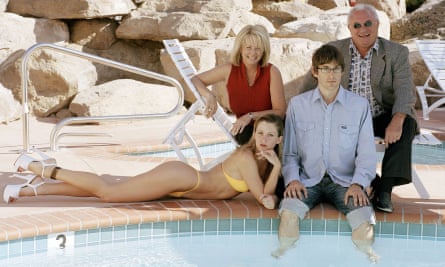
Most people’s TV heroes are fictional ones, but then Louis Theroux has always struck me as a kind of fictional character. I first encountered him onscreen in the 90s for his Weird Weekends series. There he was, sitting in hot tubs with swingers or hanging out with black nationalists in Harlem and somehow managing to be welcomed into their world despite sticking out like a sore thumb … surely this guy wasn’t real?!
TV interviewers were never like Louis. They were bullish and tenacious and confrontational. But Louis barely seemed to be interviewing people at all, his questions conveyed with little more than a widening of the eyes or a nervous smile. And that was all it took for his subjects – be they Keith Harris or the bigots of the Westboro baptist church – to reveal their true selves. Louis represented a triumph for the quiet guy, the nerdy and the intrigued. And even when he messed up – meeting Jimmy Savile and failing to uncover the years of sexual abuse – he turned it into important, compelling TV with the mea culpa Louis Theroux: Savile.
A few years into my own journalistic career, I remember pottering around the office one day when my phone rang with a familiar voice on the end of the line: “Hi Tim, it’s Louis!”
“Louis?” I thought, “Louis who?!” Slowly it dawned on me that I’d arranged an interview with my hero then promptly forgotten about it. As I bluffed my way through, trying to buy time with stilted small talk as I rooted around for a recording device, I felt incredibly proud of myself. Years of marvelling at one of the master interviewers had led me to this career pinnacle – completely forgetting I was supposed to be doing an interview at all. Tim Jonze
Lisa Simpson

Lisa Marie Simpson is a peculiar girl. She’s yellow and has four fingers for a start, but that isn’t what I mean. Lisa is a cynical, smart, feminist eight-year-old, who’s also a vegetarian, a member of Mensa and a jazz virtuoso. And, having watched her avidly from an early age, I have long identified with her preternatural understanding that a) the world’s just a bit crap and b) sometimes you have to go against the grain.
Lisa always felt slightly out of place – seemingly feeling her emotions deeper than everyone around her, wanting to protect the environment from hypercapitalist villains like Mr Burns and often coming across as a major buzzkill. But, like me, deep down Lisa just wanted everyone to like her, like the time when she put on a tie-dye top and a backwards cap, trying just a little too hard to be accepted by the cool kids. Ultimately, though, she stayed true to herself – suing the sexist manufacturers of the Malibu Stacey doll and telling the organisers of the Little Miss Springfield pageant that she wouldn’t be their “corporate shill”. In two very believable jumps into the future, we even saw her become US president and ditch her fiancee after finding out she thought the Simpsons were losers.
The Simpsons has been appalling for ages now, and if I watched it today I’m not sure I would connect with Lisa in the same way. Even so, I appreciate everything she taught me about being a weird kid, and learning to embrace it. Hannah J Davies
Dale Cooper, Twin Peaks

In many ways Twin Peaks’s resident coffee-chugging FBI agent is the worst TV idol possible. For a start, he’s a man of such unwavering decency, fortitude, intelligence and optimism that trying to match him would only result in some sort of stomach ulcer. Second, all these noble qualities got him nowhere in the end: trapped in the purgatorial dream space of the Black Lodge at the finishing line of the original series, then left in an even more bizarre realm at the confounding conclusion of this year’s revival.
Still, if there’s a reason to try and aspire to Coop’s possibly doomed way of thinking, it’s because he’s a tryer too. Despite being dealt a horrible hand by the fates – trapped in the form of a doughy Vegas insurance salesman for an interminable length of time, to cite one of many examples – he keeps plugging on in his pursuit of justice, truth and a dynamite slice of apple pie. Even if we don’t possess Coop’s other gifts, that notion of soldiering on in unpleasant, intractable or downright desperate situations is something all of us can manage. Wherever – or whenever – Dale Cooper is now, you can bet he’s doing the same. Gwilym Mumford
Elaine Benes, Seinfeld
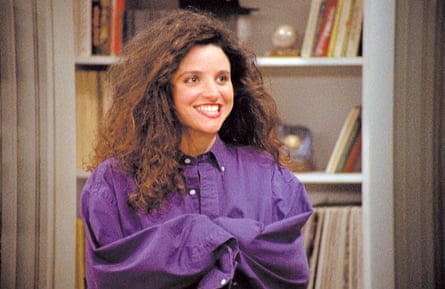
Unusually for a comedy character, Elaine Benes is quite difficult to pin down. That’s because, unlike pretty much all her sitcom peers, she’s not a truncated collection of cartoonish traits. She’s outlandishly funny, but she’s not a “funny woman”. She’s frequently angry, but never a harridan. She’s phlegmatic and neurotic, moral and morally dubious – passionately defending abortion, and stopping off to buy herself sweets before visiting her recently hospitalised boyfriend. She’s both chronically flirtatious and sartorially Mormon-esque, swishing about in ankle-grazing coats and high-necked dresses. It’s not this blizzard of conflicting characteristics that makes Elaine aspirational – but it does make her seductively human.
Elaine and I enjoy many of the same activities: having arguments with people we barely know, making absolutely everything into a joke, finding fun new ways to ridicule close friends. But Elaine never seems to feel any degree of guilt about her effect on others. She is untroubled by conscience, spending her life solely in pursuit of her own little kicks.
I wouldn’t actually want to be Elaine – in keeping with Seinfeld’s “no hugging, no learning” ethos, she’s almost sociopathically unfeeling – but I’d love a fraction of her certainty that satisfying her own needs first and foremost is both necessary and worthwhile. In a nutshell, Elaine has made me strive to be more ruthless, selfish and cold-hearted. If that’s not a positive role model, I don’t know what is. Rachel Aroesti
Dave Lister, Red Dwarf
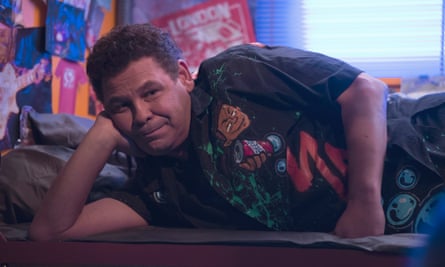
The simple truth is this: if people were a bit more like Dave Lister, Red Dwarf’s smeggiest of stellar slobs, the world would be a much better place. Sure, he’s lazy, whiling away his hours drinking lager, smoking rollies and eating curries, as opposed to actually doing anything tangible. But he’s kind. He’s a hopeless romantic. He’s noble, in his own way. And, most importantly, he’s the inventor of the triple-fried egg chilli-chutney sandwich. If Lister were in fact the last human being alive as he is in the show, humanity could do much worse.
As a carefree boy flowering into a spotty, ripe-armpitted teenager, Lister was a paragon of what one could achieve without achieving anything. As that teenager became a scrawny student who got 80% of his calorific intake from Strongbow, Lister was still there, showing how marvellous life could be when boiled down to its simplest pleasures. Admittedly, as that student blobbed into the man I am today, I do wonder if the sedentary Lister was the wisest role model to choose. Then I remember how superb curries, cigarettes and lager are, and decide that yes. Yes he was. Other idols may be braver and more impressive. But does that make them more worthy of adoration than this man described by Arnold Rimmer as “a complete gimp”? Probably. But I don’t care. Luke Holland
Lester Freamon, The Wire
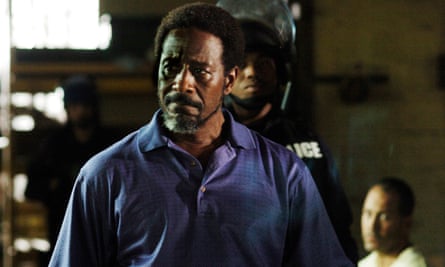
There’s so much to admire about Lester Freamon, this small-time detective in a run-down town. He’s good at his job but gets zero recognition; instead, when he angers his bosses, he’s demoted and shoved in a basement to work on the pawn shop unit – for 13 years and four months. That’s a long time to be ignored. But he keeps his cool – which, when set against fellow detective Jimmy McNulty’s spectacular self-absorption, only makes him shine brighter.
Season three sees him calling McNulty out: “A life, Jimmy, you know what that is? It’s the shit that happens while you’re waiting for moments that never come.” Clarke Peters infused this old soul with such warmth, such quiet charisma, such dignity. Freamon knows who he is, and he isn’t his work. He doesn’t talk too much or too loud, and whenever he does speak up, people take note. When we meet him in season one, he’s making doll’s house furniture at his desk, a delicate sideline that stands in startling contrast to the perpetually-pissed-off police force he belongs to. He can smile wide and laugh long; he can still fall in love. He starts something up with vulnerable informant Shardene Innes in season one, which might seem dodgy until you reach season five and realise they’re still together: he wasn’t playing around; he wasn’t taking advantage.
He can still get angry too, with that kind of rare, righteous anger that makes you pay attention. Because, despite the city of Baltimore – with its cronyism, its corruption, its violence, its ineptitude – doing its level best to disprove this notion, policing still matters to him. He is seasoned, but not jaded, clear-sighted but not cynical. He’s seen it all before, but he still cares. Freamon makes me aspire, quite simply, to be better. He’s an Aslan of a man. Dale Berning Sawa
Gaius Baltar, Battlestar Galactica
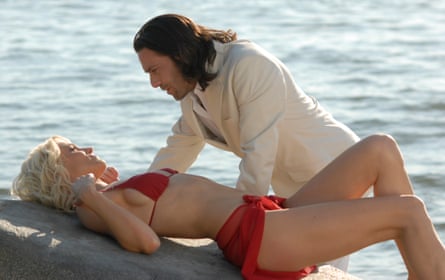
Ah, Gaius Baltar. The clue’s in the name. His initials were the opposite of the show that birthed him. Gaius, a common Roman name often borne by emperors; Baltar, probably referring back to the biblical Balthasar, last king of ancient Babylon, who saw the writing on the wall but could not read them without David. The words read “You have been weighed and found wanting.”
And wanting Gaius was, in every sense. A narcissistic womaniser and self-serving coward, he only ever had one thing on his mind. Himself. A close second was sex, suavely pursued even when it led to poor decisions, which was all the time.
Over the show’s run Baltar proves himself a problematic fave. A proto-Russell Brand character, skilfully portrayed by actor James Callis, he was handsome, funny, supremely intelligent, and adept at improvising.
I’ve always had a soft spot for cheeky bullshitters who can sniff out an advantage. People who I sense are better at the game of life than me. I’m sure I’m not the only one, and Lord knows the world is currently in a terrible state because of this. It’s indefensible, but it’s a thing.
Baltar is gifted a character arc to die for, a Shakespearian trajectory which sees him ultimately overtaken by a genuine religious conversion, and defining himself via self-sacrifice, love and courage, blah blah. To be honest, though, I preferred him at his worst. Far more than the moral heroes and upright military figures surrounding him, he looked like the most fun to be around. In a show concerned with what it is to be human, Baltar represents weakness of flesh and spirit. In other words, he’s it. Rhik Samadder
Who is your TV idol and what have they taught you? Who do you channel in your life and why? Share your reasons – and your favourite screen moments of theirs – in the comments below and we’ll publish the best.

Comments (…)
Sign in or create your Guardian account to join the discussion